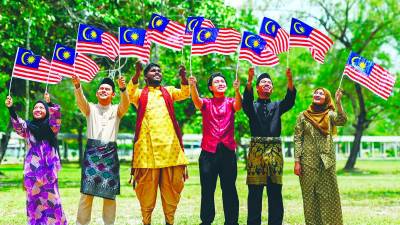EVERY year, Malaysians celebrate Independence Day on Aug 31. Not long after, Malaysia Day is commemorated on Sept 16.
While the former marks the birth of a sovereign nation free from colonial rule, the latter celebrates the formation of the broader Malaysian Federation in 1963, when Malaya, Sabah and Sarawak came together.
Since achieving independence in 1957, incidents of racial tension have, unfortunately, never been unfamiliar to Malaysians. Almost every week, there seems to be a new headline or commentary highlighting how certain issues are framed through the lens of race.
What is striking, however, is how something so seemingly simple – a mistake in advertising, a slip of the tongue or even a policy with no direct link to ethnicity – quickly gets attributed to race or hatred.
A disagreement in public discourse can suddenly be reframed as an attack on one community. A business decision can be interpreted as discrimination. Even light-hearted or trivial matters are sometimes given racial undertones.
Take, for instance, the recent case of a clinic that was ordered to close for 30 days after displaying the Malaysian flag upside down. Some criticised the clinic’s carelessness in handling something as important as the national flag. But others were quick to turn it into a racial issue, flooding social media with claims about how a particular community was allegedly showing disrespect.
What could have been explained as a mistake or perhaps incompetence was instead racialised and blown out of proportion.
Which brings to mind the old saying: “Don’t attribute to malice what can be attributed to incompetence.” Not every error is born out of hatred and not every oversight is fuelled by ill intentions. Yet, in a society where sensitivities run deep, people often leap to the harshest possible interpretation.
Part of this tendency stems from our history and politics. For decades, Malaysia’s social fabric has been filtered through the lens of race, from policies to political campaigns. Politicians often play up these divides because it benefits them to do so.
But here is the truth: we, the people, are bigger than our politicians. Ordinary Malaysians have proven time and again that we can live, work and laugh together in ways that defy the narrow categories our leaders try to confine us in.
So, how do we do better as a nation? Maybe part of the answer lies in looking at the everyday things that already bring us together.
If there is one thing Malaysians can agree on, it is food. Think about how we all get excited over new food trends. Just recently, Inside Scoop rolled out Merdeka Day ice cream flavours in collaboration with nostalgic brands that many Malaysians grew up with.
Or think about the long conversations people have while sipping on Zus coffee, debating whether the Spanish Latte is better than the CEO Coconut Latte. And of course, the ultimate Malaysian question: Whose nasi lemak is better? Some swear by Bungkus Kaw Kaw, others cannot live without Burung Hantu or Wanjo.
At the end of the day, these little debates are not about division; they are about joy. Remember how the whole nation stood still to cheer on Datuk Seri Lee Chong Wei during his matches or how Datuk Nicol David became a symbol of pride for every Malaysian, regardless of race?
Even today, whether it is Harimau Malaya on the football field or our athletes on the international stage, Malaysians come together to celebrate their victories and lament their defeats as one.
Then there are the shared struggles that remind us how much we are alike. Whether it is enduring the legendary traffic jams, dealing with flash floods or even laughing at ourselves when we queue for hours for bubble tea or the latest sales, these experiences cut across ethnic lines. They remind us that we are all facing the same daily realities and toils together.
At the end of the day, unity is not always found in the big speeches or official slogans but in the food we share, the holidays we enjoy and the everyday ways we live together. That is the Malaysia worth celebrating.
So maybe the real challenge is to pause before reacting, to ask ourselves: Is this really about race or are we letting old wounds and political rhetoric cloud our judgement? If we can resist that instinct and give one another the benefit of the doubt, we will see that we are already united in more ways than we think.
Happy Merdeka and Happy Malaysia Day soon. Tanah tumpah darahku.
Dr Nur Najah Radhiah Zainal Abidin is a senior lecturer at the Department of English Language, Faculty of Languages and Linguistics, Universiti Malaya. Comments: letters@thesundaily.com
